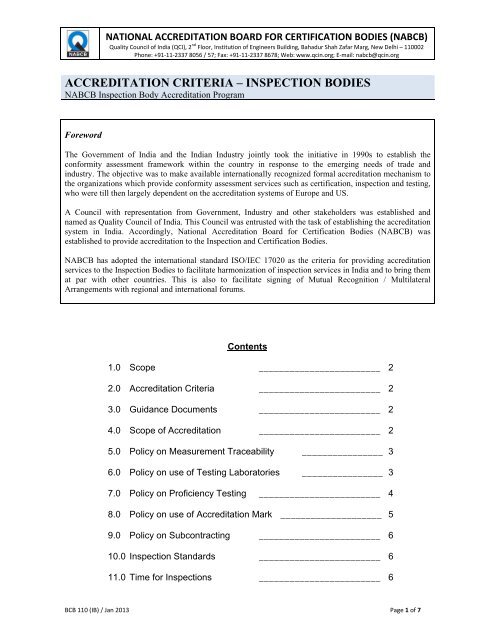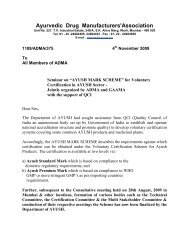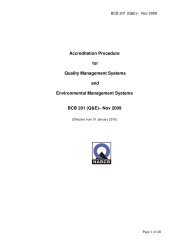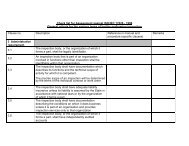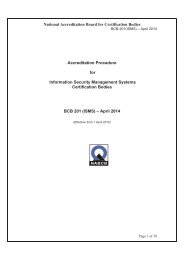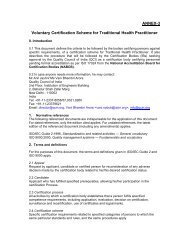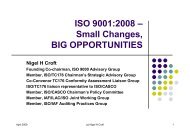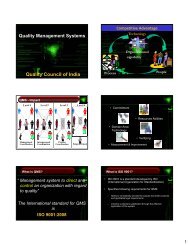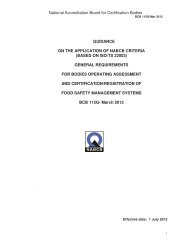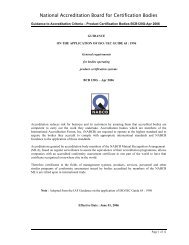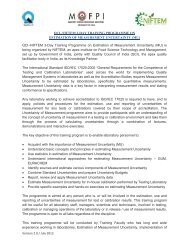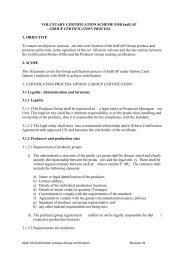accreditation criteria â inspection bodies - Quality Council of India
accreditation criteria â inspection bodies - Quality Council of India
accreditation criteria â inspection bodies - Quality Council of India
You also want an ePaper? Increase the reach of your titles
YUMPU automatically turns print PDFs into web optimized ePapers that Google loves.
NATIONAL ACCREDITATION BOARD FOR CERTIFICATION BODIES (NABCB)<br />
<strong>Quality</strong> <strong>Council</strong> <strong>of</strong> <strong>India</strong> (QCI), 2 nd Floor, Institution <strong>of</strong> Engineers Building, Bahadur Shah Zafar Marg, New Delhi – 110002<br />
Phone: +91-11-2337 8056 / 57; Fax: +91-11-2337 8678; Web: www.qcin.org; E-mail: nabcb@qcin.org<br />
ACCREDITATION CRITERIA – INSPECTION BODIES<br />
NABCB Inspection Body Accreditation Program<br />
Foreword<br />
The Government <strong>of</strong> <strong>India</strong> and the <strong>India</strong>n Industry jointly took the initiative in 1990s to establish the<br />
conformity assessment framework within the country in response to the emerging needs <strong>of</strong> trade and<br />
industry. The objective was to make available internationally recognized formal <strong>accreditation</strong> mechanism to<br />
the organizations which provide conformity assessment services such as certification, <strong>inspection</strong> and testing,<br />
who were till then largely dependent on the <strong>accreditation</strong> systems <strong>of</strong> Europe and US.<br />
A <strong>Council</strong> with representation from Government, Industry and other stakeholders was established and<br />
named as <strong>Quality</strong> <strong>Council</strong> <strong>of</strong> <strong>India</strong>. This <strong>Council</strong> was entrusted with the task <strong>of</strong> establishing the <strong>accreditation</strong><br />
system in <strong>India</strong>. Accordingly, National Accreditation Board for Certification Bodies (NABCB) was<br />
established to provide <strong>accreditation</strong> to the Inspection and Certification Bodies.<br />
NABCB has adopted the international standard ISO/IEC 17020 as the <strong>criteria</strong> for providing <strong>accreditation</strong><br />
services to the Inspection Bodies to facilitate harmonization <strong>of</strong> <strong>inspection</strong> services in <strong>India</strong> and to bring them<br />
at par with other countries. This is also to facilitate signing <strong>of</strong> Mutual Recognition / Multilateral<br />
Arrangements with regional and international forums.<br />
Contents<br />
1.0 Scope ________________________ 2<br />
2.0 Accreditation Criteria ________________________ 2<br />
3.0 Guidance Documents ________________________ 2<br />
4.0 Scope <strong>of</strong> Accreditation ________________________ 2<br />
5.0 Policy on Measurement Traceability ________________ 3<br />
6.0 Policy on use <strong>of</strong> Testing Laboratories ________________ 3<br />
7.0 Policy on Pr<strong>of</strong>iciency Testing ________________________ 4<br />
8.0 Policy on use <strong>of</strong> Accreditation Mark ____________________ 5<br />
9.0 Policy on Subcontracting ________________________ 6<br />
10.0 Inspection Standards ________________________ 6<br />
11.0 Time for Inspections ________________________ 6<br />
BCB 110 (IB) / Jan 2013 Page 1 <strong>of</strong> 7
NATIONAL ACCREDITATION BOARD FOR CERTIFICATION BODIES (NABCB)<br />
<strong>Quality</strong> <strong>Council</strong> <strong>of</strong> <strong>India</strong> (QCI), 2 nd Floor, Institution <strong>of</strong> Engineers Building, Bahadur Shah Zafar Marg, New Delhi – 110002<br />
Phone: +91-11-2337 8056 / 57; Fax: +91-11-2337 8678; Web: www.qcin.org; E-mail: nabcb@qcin.org<br />
1.0 Scope<br />
This document specifies the requirements that an <strong>inspection</strong> body shall meet if it is to be recognized by the<br />
Board as competent and reliable in the providing <strong>inspection</strong> services.<br />
2.0 Accreditation Criteria<br />
The Inspection Bodies seeking <strong>accreditation</strong> for Inspection in specific technical areas shall comply with the<br />
requirements as specified in the international standard ISO/IEC 17020:2012 “Conformity assessment –<br />
Requirements for the operation <strong>of</strong> various types <strong>of</strong> <strong>bodies</strong> performing <strong>inspection</strong>”<br />
The standard ISO/IEC 17020:2012 can be obtained online from ISO website ‘www.iso.org’ or its equivalent<br />
<strong>India</strong>n adopted standard can be procured from the Bureau <strong>of</strong> <strong>India</strong>n Standards.<br />
3.0 Guidance Documents for Inspection Bodies<br />
NABCB has adopted relevant ILAC and APLAC requirements and guidance documents as applicable to the<br />
Inspection Bodies as part <strong>of</strong> its <strong>criteria</strong> to be read with the <strong>criteria</strong> as above.<br />
NABCB has adopted the IAF/ILAC Joint Document “IAF/ILAC A4: Guidance on the Application <strong>of</strong><br />
ISO/IEC 17020”. Applicant and accredited <strong>inspection</strong> <strong>bodies</strong> shall comply with the guidance given in this<br />
document. This document provides guidance to <strong>inspection</strong> <strong>bodies</strong> to comply with the requirements <strong>of</strong><br />
ISO/IEC 17020 and is used for assessment <strong>of</strong> <strong>inspection</strong> <strong>bodies</strong> in a harmonized manner by the <strong>accreditation</strong><br />
<strong>bodies</strong>’ world over. This guidance document forms the basis <strong>of</strong> mutual recognition arrangements between<br />
<strong>accreditation</strong> <strong>bodies</strong>, and is considered necessary for the consistent application <strong>of</strong> ISO/IEC 17020. This<br />
document can be freely downloaded from ILAC website ‘www.ilac.org’ or directly accessing the link given<br />
below:<br />
https://www.ilac.org/ilaciafjoint.html<br />
NABCB has also adopted the APLAC Document “APLAC TC 006: APLAC Guidance Notes on ISO/IEC<br />
17020”. Applicant and accredited <strong>inspection</strong> <strong>bodies</strong> shall comply with the guidance given in this document.<br />
This document provides guidance notes additional to the IAF/ILAC A4 Guidance Document on<br />
<strong>accreditation</strong> <strong>of</strong> <strong>inspection</strong> <strong>bodies</strong>. It is intended primarily to assist <strong>inspection</strong> <strong>bodies</strong> to understand issues<br />
that will be examined by <strong>accreditation</strong> <strong>bodies</strong> during assessments. It is to be used in conjunction with the<br />
IAF/ILAC A4 document. This document can be freely downloaded from APLAC website ‘www.aplac.org’<br />
or directly accessing the link given below:<br />
http://www.aplac.org/publications.html<br />
Since the guidance documents may be revised from time to time by the organization which has published it,<br />
its latest version shall apply unless announced otherwise by the NABCB.<br />
4.0 Scope <strong>of</strong> Accreditation<br />
NABCB would categorize the scope <strong>of</strong> <strong>accreditation</strong> based on the broad ‘NABCB Classification <strong>of</strong> Scope<br />
Sectors’. The <strong>inspection</strong> body shall while applying for <strong>accreditation</strong> to NABCB specify its detailed scope.<br />
The scope <strong>of</strong> <strong>accreditation</strong> after assessment shall be issued to reflect the demonstrated technical competence<br />
<strong>of</strong> the <strong>inspection</strong> body.<br />
BCB 110 (IB) / Jan 2013 Page 2 <strong>of</strong> 7
NATIONAL ACCREDITATION BOARD FOR CERTIFICATION BODIES (NABCB)<br />
<strong>Quality</strong> <strong>Council</strong> <strong>of</strong> <strong>India</strong> (QCI), 2 nd Floor, Institution <strong>of</strong> Engineers Building, Bahadur Shah Zafar Marg, New Delhi – 110002<br />
Phone: +91-11-2337 8056 / 57; Fax: +91-11-2337 8678; Web: www.qcin.org; E-mail: nabcb@qcin.org<br />
5.0 Policy on Measurement Traceability<br />
Traceability is the property <strong>of</strong> a measurement result whereby the result can be related to stated references,<br />
usually national or international standards, through a documented unbroken chain <strong>of</strong> comparisons (i.e.<br />
calibrations), each having stated measurement uncertainties. The purpose <strong>of</strong> requiring traceability is to<br />
ensure that measurements are accurate representations <strong>of</strong> the specific quantity subject to measurement,<br />
where measurement results form the basis <strong>of</strong> <strong>inspection</strong> results.<br />
ILAC Document - ILAC P10 “ILAC Policy on Traceability <strong>of</strong> Measurement Results” available on ILAC<br />
website ‘www.ilac.org’ forms the basis <strong>of</strong> NABCB Policy on Measurement Traceability. Traceability <strong>of</strong><br />
measurement results is a fundamental topic for equivalence as well as harmonization <strong>of</strong> measurement results<br />
provided by conformity assessment <strong>bodies</strong> including <strong>inspection</strong> <strong>bodies</strong> and to ensure confidence amongst<br />
<strong>accreditation</strong> <strong>bodies</strong> to maintain international Mutual Recognition Arrangements.<br />
NABCB Policy on Measurement Traceability applicable to all NABCB applicant/accredited Inspection<br />
Bodies is as follows:<br />
i. Inspection Bodies shall be able to demonstrate that calibration <strong>of</strong> critical equipment, whether owned by<br />
itself or others, used in <strong>inspection</strong> and hence the measurement results generated by that equipment,<br />
relevant to the applied / accredited scopes <strong>of</strong> <strong>accreditation</strong>, are traceable to the International System <strong>of</strong><br />
Units (SI units).<br />
ii. NABCB accepts as an evidence <strong>of</strong> traceability to national and international standards <strong>of</strong> measurements<br />
<strong>of</strong> those calibrations performed by:<br />
a) National Metrology Institutes such as NPL-<strong>India</strong> or other CIPM (International Committee for<br />
Weights and Measures) MRA Signatories;<br />
b) Calibration laboratories accredited by NABL-<strong>India</strong>, an ILAC and APLAC MRA Signatory, or those<br />
demonstrating compliance to ISO/IEC 17025;<br />
c) Calibration laboratories accredited by other ILAC MRA Signatories.<br />
iii. Where traceability as stated above is not technically possible or reasonable or available, the <strong>inspection</strong><br />
body and the client and other interested parties may agree to using certified reference materials provided<br />
by a competent supplier or using specified methods and/or consensus standards that are clearly described<br />
and agreed by all parties.<br />
6.0 Policy on use <strong>of</strong> Testing Laboratories as part <strong>of</strong> Inspection<br />
Inspection Bodies use the services <strong>of</strong> laboratories for testing as a part <strong>of</strong> its <strong>inspection</strong> activities. NABCB<br />
Policy on use <strong>of</strong> laboratories for testing by the Inspection Bodies is as follows:<br />
i. When as a part <strong>of</strong> <strong>inspection</strong>, for confirming product compliance to relevant standard, analytical tests are<br />
required to be carried out in an laboratory, the <strong>inspection</strong> personnel may draw sample(s) and send it to<br />
their own laboratory or an independent external laboratory. Inspection <strong>bodies</strong> shall ensure that the<br />
laboratories to which samples are sent for testing shall either be accredited or compliant to ISO/IEC<br />
17025 for the scope <strong>of</strong> tests being subcontracted.<br />
ii. When as a part <strong>of</strong> <strong>inspection</strong>, the <strong>inspection</strong> body is required to review test reports for the purpose <strong>of</strong><br />
assessing conformity to specified requirements/<strong>criteria</strong>, the testing shall have been carried out in<br />
laboratories complying with ISO/IEC 17025 as established by the <strong>inspection</strong> body or accredited to<br />
ISO/IEC 17025.<br />
BCB 110 (IB) / Jan 2013 Page 3 <strong>of</strong> 7
NATIONAL ACCREDITATION BOARD FOR CERTIFICATION BODIES (NABCB)<br />
<strong>Quality</strong> <strong>Council</strong> <strong>of</strong> <strong>India</strong> (QCI), 2 nd Floor, Institution <strong>of</strong> Engineers Building, Bahadur Shah Zafar Marg, New Delhi – 110002<br />
Phone: +91-11-2337 8056 / 57; Fax: +91-11-2337 8678; Web: www.qcin.org; E-mail: nabcb@qcin.org<br />
iii. When as a part <strong>of</strong> <strong>inspection</strong>, the <strong>inspection</strong> personnel witness testing at client’s or vendor’s laboratory<br />
at the site or elsewhere, the <strong>inspection</strong> <strong>bodies</strong> shall ensure that these laboratories demonstrate<br />
compliance to relevant requirements as specified in Clauses 6.1, 6.2 and 7.1 <strong>of</strong> ISO/IEC 17020:2012.<br />
7.0 Policy on Pr<strong>of</strong>iciency Testing (PT)<br />
Pr<strong>of</strong>iciency Testing (PT) is typically associated with laboratory <strong>accreditation</strong> and is defined as a process for<br />
checking actual laboratory testing performance, usually by means <strong>of</strong> inter-laboratory test data comparisons.<br />
For many tests and calibrations, results from pr<strong>of</strong>iciency testing are very good indicators <strong>of</strong> competence.<br />
However in some instances pr<strong>of</strong>iciency testing may be relevant to <strong>inspection</strong> <strong>bodies</strong>. Pr<strong>of</strong>iciency testing<br />
serves to supplement existing procedures adopted by <strong>inspection</strong> <strong>bodies</strong> to assure the quality and evaluation<br />
<strong>of</strong> performance <strong>of</strong> the activities for which they are accredited or seek <strong>accreditation</strong>.<br />
ILAC Document “ILAC P9: ILAC Policy for Participation in Pr<strong>of</strong>iciency Testing Activities” available on<br />
ILAC website ‘www.ilac.org’ forms the basis <strong>of</strong> NABCB Policy on Pr<strong>of</strong>iciency Testing by Inspection<br />
Bodies. APLAC Requirement Document “APLAC MR 001: Procedures for Establishing and Maintaining<br />
the APLAC Mutual Recognition Agreement among Accreditation Bodies” under clause 3.3.2 states:<br />
- Pr<strong>of</strong>iciency testing activities are also applicable to certain types <strong>of</strong> <strong>inspection</strong>. An applicant <strong>accreditation</strong><br />
body to the APLAC MRA for <strong>inspection</strong> shall have a documented policy on pr<strong>of</strong>iciency testing, and<br />
encourage its accredited <strong>inspection</strong> <strong>bodies</strong> to participate where relevant pr<strong>of</strong>iciency testing activities are<br />
available.<br />
NABCB encourages its applicant/accredited <strong>inspection</strong> <strong>bodies</strong> to participate in appropriate PT activities,<br />
where available and/or relevant. It shall be the responsibility <strong>of</strong> <strong>inspection</strong> <strong>bodies</strong> to check the availability <strong>of</strong><br />
appropriate PT programs which best match their day-to-day work and to select the programs in which to<br />
participate as per their scope <strong>of</strong> <strong>accreditation</strong>. NABCB will provide information, as may be available, to its<br />
applicant/accredited <strong>inspection</strong> <strong>bodies</strong> on PT programs organized by APLAC or other ILAC recognized<br />
regions or by ILAC MRA Signatories and their accredited PT Providers.<br />
In considering the application <strong>of</strong> pr<strong>of</strong>iciency testing to <strong>inspection</strong> <strong>bodies</strong>, the specialized nature <strong>of</strong> many<br />
<strong>inspection</strong>s and the small number <strong>of</strong> <strong>inspection</strong> <strong>bodies</strong> practicing in any one area may make reliance upon<br />
externally sourced pr<strong>of</strong>iciency testing challenging. Accordingly, “Pr<strong>of</strong>iciency Testing” should at least<br />
involve internally conducted technical witnessing <strong>of</strong> inspectors and other activities that assure the quality <strong>of</strong><br />
<strong>inspection</strong> activities.<br />
The quality <strong>of</strong> <strong>inspection</strong> activities may be established by the <strong>inspection</strong> <strong>bodies</strong> in a number <strong>of</strong> ways which<br />
include, but are not limited to:<br />
a) Comparison <strong>of</strong> findings<br />
Several inspectors (drawn from one or several <strong>inspection</strong> <strong>bodies</strong>) may inspect an item (either concurrently<br />
or over a time interval such that the stability <strong>of</strong> the inspected item is assured) and the findings are then<br />
compared. Comparisons may be numerical or qualitative and a statistical analysis <strong>of</strong> outcomes may<br />
highlight whether the findings from each inspector are satisfactory. Comparison is against the consensus<br />
<strong>of</strong> the group.<br />
b) Measurement audits<br />
An object <strong>of</strong> <strong>inspection</strong> with known reference values or qualities may be used in a manner similar to that<br />
described in a) above. The extent <strong>of</strong> variance between the reported results from the inspector and the<br />
reference value / quality may be used as a performance evaluation tool.<br />
BCB 110 (IB) / Jan 2013 Page 4 <strong>of</strong> 7
NATIONAL ACCREDITATION BOARD FOR CERTIFICATION BODIES (NABCB)<br />
<strong>Quality</strong> <strong>Council</strong> <strong>of</strong> <strong>India</strong> (QCI), 2 nd Floor, Institution <strong>of</strong> Engineers Building, Bahadur Shah Zafar Marg, New Delhi – 110002<br />
Phone: +91-11-2337 8056 / 57; Fax: +91-11-2337 8678; Web: www.qcin.org; E-mail: nabcb@qcin.org<br />
c) Technical witnessing<br />
An inspector may observe another inspector in the course <strong>of</strong> an <strong>inspection</strong>, to confirm the coverage and<br />
application <strong>of</strong> judgment. This technique is frequently used as a measure <strong>of</strong> the effectiveness <strong>of</strong> training.<br />
IAF/ILAC A4 requires that the monitoring <strong>of</strong> performance <strong>of</strong> <strong>inspection</strong>s should include on-site<br />
witnessing <strong>of</strong> <strong>inspection</strong>s by technically competent personnel and cover a representative sample <strong>of</strong><br />
<strong>inspection</strong>s.<br />
d) Review <strong>of</strong> <strong>inspection</strong> reports, records and supporting materials<br />
In some cases the reports & records <strong>of</strong> <strong>inspection</strong> will be sufficient to establish whether the <strong>inspection</strong> was<br />
conducted properly and it is therefore possible for a high degree <strong>of</strong> assurance to be established through<br />
review <strong>of</strong> a comprehensive set <strong>of</strong> records. An example could include structural and condition <strong>inspection</strong>s<br />
where these are supported by extensive photographic records, original observations, notes, drawings etc.<br />
The above activities are able to discriminate between varying levels <strong>of</strong> performance on the part <strong>of</strong> the<br />
inspector, across the diverse dimensions <strong>of</strong> the service delivery. They, however, serve as examples and<br />
<strong>inspection</strong> <strong>bodies</strong> should draw upon them as appropriate to their industry, the environment, the processes <strong>of</strong><br />
service delivery and the <strong>inspection</strong> task.<br />
Inspection <strong>bodies</strong> should identify their approach to assuring the quality <strong>of</strong> <strong>inspection</strong> services, by including a<br />
statement, policy or procedure in their management system. Where possible, an <strong>inspection</strong> body should have<br />
a plan on their intended participation in relevant pr<strong>of</strong>iciency testing activities, to cover the major technical<br />
areas included in its scope <strong>of</strong> <strong>accreditation</strong>.<br />
8.0 Policy on use <strong>of</strong> NABCB Accreditation Mark<br />
NABCB strongly encourages its accredited <strong>inspection</strong> <strong>bodies</strong> to use NABCB Accreditation Mark on its<br />
<strong>inspection</strong> reports/certificates to promote <strong>accreditation</strong> granted to their <strong>inspection</strong> services. It is each<br />
<strong>inspection</strong> body’s responsibility to ensure that it describes its NABCB Accreditation Status in a manner that<br />
does not imply that <strong>accreditation</strong> is held in areas that are outside the scope <strong>of</strong> <strong>accreditation</strong>, for its other<br />
activities and branch <strong>of</strong>fices facilities that are not included in the <strong>accreditation</strong> or for products or services<br />
that NABCB <strong>accreditation</strong> does not cover.<br />
ILAC Document “ILAC P8: ILAC Mutual Recognition Arrangement (Arrangement) - Supplementary<br />
Requirements and Guidelines for the Use <strong>of</strong> Accreditation Symbols and for Claims <strong>of</strong> Accreditation Status<br />
by Accredited Laboratories and Inspection Bodies” available on ILAC website ‘www.ilac.org’ forms the<br />
basis <strong>of</strong> NABCB Policy on Use <strong>of</strong> NABCB Accreditation Mark by Inspection Bodies. The detailed<br />
conditions on use <strong>of</strong> NABCB Accreditation Mark are prescribed in NABCB document BCB 202.<br />
While the use <strong>of</strong> “NABCB Accreditation Mark” on <strong>inspection</strong> reports / certificates is not mandatory, only<br />
<strong>inspection</strong> reports/certificates bearing the “NABCB Accreditation Mark” (or that otherwise make reference<br />
to accredited status by a specific, recognized <strong>accreditation</strong> body) can benefit from the acceptance established<br />
through mutual recognition agreements/arrangements amongst <strong>accreditation</strong> <strong>bodies</strong> globally.<br />
Inspection reports/certificates issued by NABCB accredited <strong>inspection</strong> <strong>bodies</strong> for the scope and locations<br />
covered under NABCB <strong>accreditation</strong>, irrespective <strong>of</strong> whether NABCB Accreditation Mark is used or not on<br />
such reports/certificates issued, shall be subject to assessment during routine NABCB Surveillances and/or<br />
Reassessments <strong>of</strong> accredited <strong>inspection</strong> <strong>bodies</strong>.<br />
NABCB Fee per <strong>inspection</strong> report/certificate as announced annually in NABCB Fee Structure shall be<br />
applicable on all <strong>inspection</strong> reports/certificates issued by NABCB accredited <strong>inspection</strong> <strong>bodies</strong> for the scope<br />
and locations covered under NABCB <strong>accreditation</strong>, with NABCB Accreditation Mark. It is the responsibility<br />
BCB 110 (IB) / Jan 2013 Page 5 <strong>of</strong> 7
NATIONAL ACCREDITATION BOARD FOR CERTIFICATION BODIES (NABCB)<br />
<strong>Quality</strong> <strong>Council</strong> <strong>of</strong> <strong>India</strong> (QCI), 2 nd Floor, Institution <strong>of</strong> Engineers Building, Bahadur Shah Zafar Marg, New Delhi – 110002<br />
Phone: +91-11-2337 8056 / 57; Fax: +91-11-2337 8678; Web: www.qcin.org; E-mail: nabcb@qcin.org<br />
and obligation <strong>of</strong> NABCB accredited <strong>inspection</strong> <strong>bodies</strong> to declare quarterly (every 3 months) the number <strong>of</strong><br />
such reports/certificates issued and related information correctly to NABCB.<br />
9.0 Policy on Subcontracting<br />
NABCB shall not grant <strong>accreditation</strong> to <strong>inspection</strong> <strong>bodies</strong> for the scope for which it does not have the<br />
competence, resources etc. and for which it intends to subcontract entire <strong>inspection</strong> activity on permanent<br />
basis.<br />
When an <strong>inspection</strong> body subcontracts <strong>inspection</strong> activities for allowable reasons as given in ISO/IEC<br />
17020:2012 other than on a permanent basis, it should select a subcontractor <strong>inspection</strong> body which meets at<br />
least the same independence <strong>criteria</strong> (Type A, B or C) as itself.<br />
Assigning <strong>inspection</strong> work to branch <strong>of</strong>fices within the organization structure <strong>of</strong> the main <strong>of</strong>fice and<br />
operating under the same quality system is not considered as subcontracting. However, operation <strong>of</strong> these<br />
branch <strong>of</strong>fices shall be assessed by NABCB, if they are to be included in the scope <strong>of</strong> <strong>accreditation</strong>. The<br />
<strong>inspection</strong> body shall also be required to demonstrate that it can exercise effective supervision over the<br />
<strong>inspection</strong>s performed by these branch <strong>of</strong>fices.<br />
10.0 Inspection Standards<br />
It would be the responsibility <strong>of</strong> the Inspection body to demonstrate that <strong>inspection</strong>s are carried out in<br />
accordance with internationally / nationally acceptable standards. Standards developed by the customer or<br />
the <strong>inspection</strong> body itself, if used, shall be appropriate and should be clearly specified in the <strong>inspection</strong><br />
contract.<br />
11.0 Time for Inspections undertaken by the Inspection Body<br />
The <strong>inspection</strong> body shall have a system for ensuring required time is spent by the <strong>inspection</strong> personnel for<br />
carrying out <strong>inspection</strong>s and for monitoring the time spent on <strong>inspection</strong>s.<br />
BCB 110 (IB) / Jan 2013 Page 6 <strong>of</strong> 7
NATIONAL ACCREDITATION BOARD FOR CERTIFICATION BODIES (NABCB)<br />
<strong>Quality</strong> <strong>Council</strong> <strong>of</strong> <strong>India</strong> (QCI), 2 nd Floor, Institution <strong>of</strong> Engineers Building, Bahadur Shah Zafar Marg, New Delhi – 110002<br />
Phone: +91-11-2337 8056 / 57; Fax: +91-11-2337 8678; Web: www.qcin.org; E-mail: nabcb@qcin.org<br />
Amendment Record<br />
Date Auth. by Description <strong>of</strong> Amendment<br />
Jan 2013 Director To incorporate ISO/IEC 17020:2012 as the <strong>accreditation</strong> <strong>criteria</strong> and<br />
to align with ILAC & APLAC requirements<br />
BCB 110 (IB) / Jan 2013 Page 7 <strong>of</strong> 7


